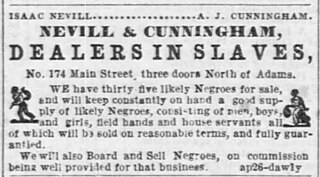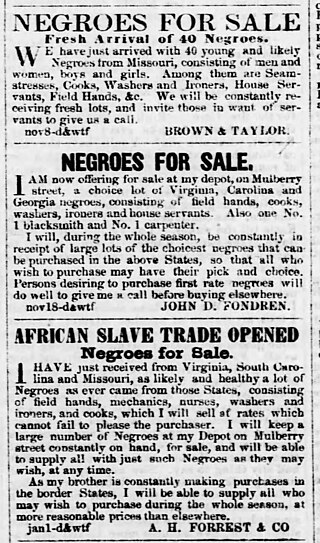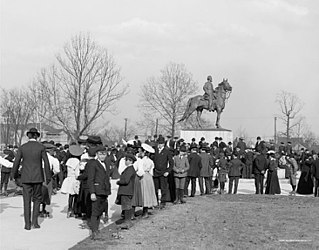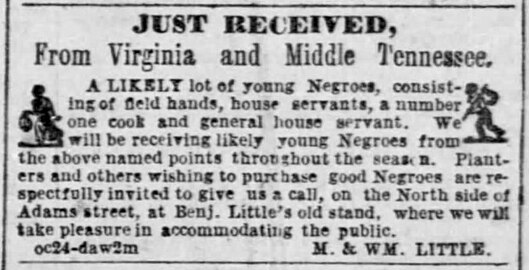
The Thirteenth Amendment to the United States Constitution abolished slavery and involuntary servitude, except as punishment for a crime. The amendment was passed by the Senate on April 8, 1864, by the House of Representatives on January 31, 1865, and ratified by the required 27 of the then 36 states on December 6, 1865, and proclaimed on December 18. It was the first of the three Reconstruction Amendments adopted following the American Civil War.

The fugitive slave laws were laws passed by the United States Congress in 1793 and 1850 to provide for the return of slaves who escaped from one state into another state or territory. The idea of the fugitive slave law was derived from the Fugitive Slave Clause which is in the United States Constitution. It was thought that forcing states to return fugitive slaves to their masters violated states' rights due to state sovereignty and was believed that seizing state property should not be left up to the states. The Fugitive Slave Clause states that fugitive slaves "shall be delivered up on Claim of the Party to whom such Service or Labour may be due", which abridged state rights because apprehending runaway slaves was a form of retrieving private property. The Compromise of 1850 entailed a series of laws that allowed slavery in the new territories and forced officials in free states to give a hearing to slave-owners without a jury.

The internal slave trade in the United States, also known as the domestic slave trade, the Second Middle Passage and the interregional slave trade, was the mercantile trade of enslaved people within the United States. It was most significant after 1808, when the importation of slaves from Africa was prohibited by federal law. Historians estimate that upwards of one million slaves were forcibly relocated from the Upper South, places like Maryland, Virginia, Kentucky, North Carolina, Tennessee, and Missouri, to the territories and states of the Deep South, especially Georgia, Alabama, Louisiana, Mississippi, Arkansas, and Texas.
Timothy S. Huebner is an American historian who focuses on the history of the American South, the U.S. Constitution, American slavery, the American Civil War, and the Reconstruction Era. Since 2002, he has been director of the Rhodes College Institute of Regional Studies in Tennessee. As of 2023, he chairs the editorial board of the Journal of Supreme Court History.

A coffle, sometimes called a platoon or a drove, was a group of enslaved people chained together and marched from one place to another by owners or slave traders. These troupes, sometimes called shipping lots before they were moved, ranged in size from a fewer than a dozen to 200 or more enslaved people.

Polly Strong was an enslaved woman in the Northwest Territory, in present-day Indiana. She was born after the Northwest Ordinance prohibited slavery. Slavery was prohibited by the Constitution of Indiana in 1816. Two years later, Strong's mother Jenny and attorney Moses Tabbs asked for a writ of habeas corpus for Polly and her brother James in 1818. Judge Thomas H. Blake produced indentures, Polly for 12 more years and James for four more years of servitude. The case was dismissed in 1819.

Byrd Hill was a slave trader of Tennessee and Mississippi prior to the American Civil War. Byrd Hill has been described as one of the "big four" slave traders in the centrally located city of Memphis on the Mississippi River. Hill was partners for a time with Nathan Bedford Forrest and is believed to have resold six of the Africans illegally trafficked to the United States on the Wanderer in 1859. Hill also made a fleeting appearance in Harriet Beecher Stowe's A Key to Uncle Tom's Cabin.

Capt. Montgomery Little, CSA was an American slave trader and a Confederate Army cavalry officer who served in Nathan Bedford Forrest's Escort Company. Little was killed in action during the American Civil War at the Battle of Thompson's Station.

Fugitive slave advertisements in the United States or runaway slave ads, were paid classified advertisements describing a missing person and usually offering a monetary reward for the recovery of the valuable chattel. Fugitive slave ads were a unique vernacular genre of non-fiction specific to the antebellum United States. These ads often include detailed biographical information about individual enslaved Americans including "physical and distinctive features, literacy level, specialized skills," and "if they might have been headed for another plantation where they had family, or if they took their children with them when they ran."

Slave markets and slave jails in the United States were places used for the slave trade in the United States from the founding in 1776 until the total abolition of slavery in 1865. Slave pens, also known as slave jails, were used to temporarily hold enslaved people until they were sold, or to hold fugitive slaves, and sometimes even to "board" slaves while traveling. Slave markets were any place where sellers and buyers gathered to make deals. Some of these buildings had dedicated slave jails, others were negro marts to showcase the slaves offered for sale, and still others were general auction or market houses where a wide variety of business was conducted, of which "negro trading" was just one part. The term slave depot was commonly used in New Orleans in the 1850s.
The Tennessee Constitutional Amendment: 3, commonly known as Amendment 3 or the Remove Slavery as Punishment for Crime from Constitution Amendment, is an approved legislatively referred constitutional amendment to the Constitution of Tennessee that appeared on November 8, 2022. The proposed amendment modifies Article I, Section 33 of the Tennessee Constitution, removing the existing provision that allows slavery and involuntary servitude as punishment for convicted individuals. Instead, the amendment explicitly states that slavery and involuntary servitude are prohibited while allowing inmates to work if they are duly convicted of a crime. The change seeks to clarify and restrict the use of involuntary labor within the state.

Isaac Neville, also known as Ike Neville, sometimes spelled Nevil or Nevill, was an American slave trader based in Memphis, Tennessee in the United States.

Forrest's jail, also known as Forrest's Traders Yard, was the slave pen owned and operated by Nathan Bedford Forrest in Memphis, Tennessee, United States. Forrest bought 87 Adams Street, located between Second and Third, in 1854. It was located next to a tavern that operated under various names, opposite Hardwick House, and behind the still-extant Episcopal church. Forrest later traded, for fewer than six months, from 89 Adams. Byrd Hill bought 87 Adams in 1859. An estimated 3,800 people were trafficked through Forrest's jail during his five years of ownership.

Aaron H. Forrest was one of the six Forrest brothers who engaged in the interregional slave trade in the United States prior to the American Civil War. He may have also owned or managed cotton plantations in Mississippi. He led a Confederate cavalry unit composed of volunteers from the Yazoo River region of Mississippi during the American Civil War. He died in 1864, apparently from illness.

Torture of slaves in the United States was fairly common, as part of what many slavers claimed was necessary discipline. As one history put it, "Stinted allowance, imprisonment, and whipping were the usual methods of punishment; incorrigibles were sometimes 'ironed' or sold."

This is a bibliography of works about Nathan Bedford Forrest (1821–1877), an American slave trader, cotton plantation owner, Confederate cavalry leader, railroad executive, and Grand Wizard of the First Klan.

Josiah Maples was a 19th-century cotton plantation owner, bank director, and slave trader of Tennessee, Mississippi, and Arkansas in the United States. Maples is notable as a slave-trading business partner of Nathan Bedford Forrest.

Forrest & Maples was an American slave-trading company based in Memphis, Tennessee, United States during the mid-1850s. The principals, Josiah Maples and Nathan Bedford Forrest, were in business together as Forrest & Maples from July 1854 to December 31, 1855.



















